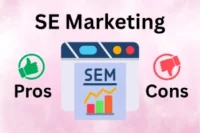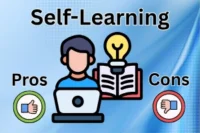Advantages & Disadvantages of Internet: Pros vs. Cons
Published: 21 Aug 2025
From instant access to information to a platform for global connection, the internet has undoubtedly revolutionized our lives. However, like any powerful tool, it comes with its own set of challenges.
Let’s dive into the advantages and disadvantages of internet, seeing how it can be used to its fullest potential, and figuring out the problems it causes in our modern world.
Internet Advantages
The internet brings many pros. It helps us find information, talk to friends, and buy things online. We can learn new stuff and do work better. The benefits of the internet are like having a big, helpful friend that makes life easier and more fun.

So, here I have come up with the list of all the 20 advantages of the internet in detail.
- Global Connectivity
- Information Retrieval
- Communication Tools
- E-commerce
- Social Media
- Cloud Computing
- Streaming Services
- Search Engines
- Collaboration Tools
- Online Learning
- Instant Messaging
- Research Opportunities
- News and Updates
- Job Search and Recruitment
- Entertainment
- Remote Work Opportunities
- Digital Marketing
- Banking and Financial Services
- Telemedicine
- GPS and Navigation Services
Let’s cover each internet merit in depth.
1. Global Connectivity
The internet connects people all over the world. You can talk to friends, family, or colleagues in different countries within seconds. It removes distance barriers and makes communication easier than ever before. In short, the internet makes the world feel smaller and more connected.
- Connect with people across the globe
- Share ideas without distance limits
- Build relationships beyond local areas
2. Information Retrieval
The internet is a huge library of information. You can search for anything and find results instantly. From simple facts to detailed guides, everything is available online. In short, the internet makes learning and research faster and easier.
- Find answers to questions instantly
- Access knowledge on any topic
- Learn faster with online resources
3. Communication Tools
The internet offers many tools to communicate. You can send emails, join video calls, or chat in real time. These tools make personal and business communication quick and simple. In short, staying in touch has never been easier.
- Send emails within a few seconds
- Talk face-to-face with video calls
- Chat instantly from any device
4. E-commerce
The internet allows people to buy and sell products online. Customers can shop from home without visiting stores. Businesses can reach more customers and grow sales easily. In short, e-commerce makes shopping simple and accessible.
- Shop online from home anytime
- Sell products to wider markets
- Save time with quick shopping
5. Social Media
The internet powers social media platforms where people connect and share. Users can post photos, videos, and thoughts with friends. Businesses also use social media for marketing and brand growth. In short, social media makes online interaction fun and useful
- Share posts with friends easily
- Build networks with global users
- Promote businesses through social media
6. Cloud Computing
The internet allows people to store and access data on the cloud. This removes the need for large physical storage devices. Files and applications can be used anytime and anywhere. In short, cloud computing makes work easier and more flexible.
- Store data safely on online servers
- Access files anytime from anywhere
- Save device space with cloud storage
7. Streaming Services
The internet gives access to movies, music, and shows through streaming. People no longer need CDs or DVDs to enjoy entertainment. You can watch or listen instantly from any device. In short, streaming makes entertainment simple and on-demand.
- Watch movies and shows instantly
- Listen to music from anywhere
- Enjoy content without physical copies
8. Search Engines
Search engines make finding information on the internet quick and easy. Just type a query and get thousands of results in seconds. They help people learn, shop, or research more effectively. In short, search engines are guides to the web.
- Find answers with simple searches
- Get results within a few seconds
- Explore websites through search engines
9. Collaboration Tools
The internet supports teamwork with digital collaboration platforms. People can share files, edit documents, and work together in real time. These tools are useful for both education and business. In short, collaboration online saves time and improves teamwork.
- Work together from different locations
- Share and edit files easily
- Improve teamwork with online tools
10. Online Learning
The internet makes education more accessible through online classes. Students can learn from anywhere without visiting schools. Many courses and tutorials are available for free or low cost. In short, online learning makes knowledge open to all.
- Study from anywhere in the world
- Learn new skills with tutorials
- Access courses at lower cost
11. Instant Messaging
The internet allows people to send quick text messages worldwide. Messages reach instantly without needing a phone call. You can also share photos, videos, and files through chat apps. In short, instant messaging makes communication faster and easier.
- Send messages in real time
- Share photos and files quickly
- Stay connected without phone calls
12. Research Opportunities
The internet gives students and professionals access to vast research material. Articles, journals, and studies are available online for free or paid. This makes research faster and more convenient than traditional methods. In short, the internet supports deep and wide research.
- Access journals and studies online
- Collect data faster than libraries
- Explore research on any subject
13. News and Updates
The internet provides the latest news within minutes. People can stay updated on global and local events anytime. Unlike newspapers, updates are instant and continuous online. In short, the internet keeps everyone informed in real time.
- Get breaking news within minutes
- Stay updated about world events
- Follow stories as they happen
14. Job Search and Recruitment
The internet makes finding and offering jobs much easier. Job seekers can apply to companies with just a click. Employers can post openings and connect with talent worldwide. In short, online platforms simplify hiring and career growth.
- Search jobs through online portals
- Apply to companies with one click
- Connect employers with global talent
15. Entertainment
The internet is a major source of entertainment. People can watch videos, play games, or listen to music anytime. It provides endless options for fun at home or on the go. In short, the internet keeps boredom away.
- Play online games for fun
- Watch videos anytime and anywhere
- Enjoy music from many platforms
16. Remote Work Opportunities
The internet makes it possible to work from home or anywhere. Employees can join meetings, share files, and finish tasks online. This saves travel time and adds flexibility to work life. In short, the internet creates better work opportunities.
- Work from home or anywhere
- Join meetings through online tools
- Save time with remote working
17. Digital Marketing
The internet allows businesses to promote their products online. Ads can reach a global audience at lower costs. Digital marketing also makes it easy to track results and improve campaigns. In short, the internet helps businesses grow faster.
- Advertise products at lower cost
- Reach more customers worldwide
- Track results of online campaigns
18. Banking and Financial Services
The internet makes banking simple and fast. People can transfer money, pay bills, or check accounts online. It saves time by reducing the need to visit banks. In short, online banking makes money management easier.
- Transfer money within a few seconds
- Pay bills through online banking
- Check account anytime from anywhere
19. Telemedicine
The internet supports healthcare through telemedicine. Patients can talk to doctors online without visiting hospitals. It saves time and gives quick medical advice. In short, telemedicine makes healthcare more accessible.
- Consult doctors through video calls
- Save time with online checkups
- Get quick advice for health issues
20. GPS and Navigation Services
The internet powers GPS apps that guide people to their destinations. You can check routes, traffic updates, and nearby places instantly. It reduces the chances of getting lost while travelling. In short, GPS makes travelling safe and easier.
- Find best routes with GPS apps
- Get real-time traffic information
- Explore nearby places quickly online
Internet Disadvantages
There are some not-so-good things about the internet, which we call “disadvantages of the internet”. These are the cons or limitations that come with using the internet.

It’s important to know about these not-so-great sides of the internet to understand it better and use it wisely.
So here’s a list of disadvantages of the internet:
- Security Concerns
- Misinformation
- Addiction and Distraction
- Social Isolation
- Online Harassment
- Dependency on Technology
- Health Concerns
- Digital Divide
- Content Regulation Challenges
- Online Scams and Fraud
Let’s cover each negative aspect of internet.
1. Security Concerns
The internet is often at risk of hacking and data theft. Personal information like passwords and bank details can be stolen. Weak security puts users and businesses in danger. In short, online safety is a big concern.
- Risk of hacking and cyberattacks
- Personal data can be stolen
- Businesses lose trust from breaches
2. Misinformation
Not all information on the internet is true. Some websites share false or misleading content. This can confuse people and spread wrong knowledge. In short, misinformation reduces the reliability of online sources.
- False news spreads very quickly
- Hard to check real sources
- Misleads people with wrong details
3. Addiction and Distraction
The internet can easily make people spend too much time online. Social media, games, and videos distract from important tasks. This leads to lower productivity in daily life. In short, the internet can become addictive.
- Wastes time with endless browsing
- Lowers focus on real work
- Causes unhealthy screen addiction
4. Social Isolation
Spending too much time online can reduce face-to-face interaction. People may prefer virtual chats instead of meeting in person. This can weaken real-life relationships and connections. In short, the internet can cause social isolation.
- Less face-to-face communication daily
- Weakens personal bonds and relations
- Encourages more virtual over real
5. Online Harassment
The internet sometimes creates space for bullying and harassment. People may face abusive comments or threats online. This can hurt confidence and mental health. In short, online harassment is a serious issue.
- Cyberbullying affects mental health
- Abusive comments damage self-esteem
- Threats make internet unsafe
6. Dependency on Technology
The internet makes people depend too much on digital tools. Simple tasks now need online help or apps. Without the internet, many feel stuck or helpless. In short, heavy dependency reduces real-life skills.
- People rely too much online
- Lose problem-solving without internet
- Basic tasks need digital help
7. Health Concerns
Too much internet use affects health. Sitting for long hours causes eye strain and body pain. Lack of exercise can also harm physical fitness. In short, overuse of the internet impacts health badly.
- Causes eye strain and fatigue
- Leads to body pain issues
- Reduces daily physical activity
8. Digital Divide
Not everyone has equal access to the internet. Poor or rural areas may lack proper connections. This creates a gap between connected and unconnected people. In short, the internet increases inequality.
- Unequal access in rural areas
- Creates gap between rich and poor
- Limits opportunities without internet
9. Content Regulation Challenges
The internet has content that is hard to control. Harmful or inappropriate material is often easily accessible. Governments and parents struggle to filter such content. In short, regulation of online content is difficult.
- Harmful content spreads without control
- Kids may access unsafe material
- Difficult to regulate all websites
10. Online Scams and Fraud
The internet is full of scams and fake offers. People may lose money by trusting false websites or emails. Online fraud damages both personal and business trust. In short, scams are a big danger online.
- Fake websites trick people easily
- Online fraud causes money loss
- Reduces trust in digital space
Conclusion
In this article, we have thoroughly covered the pros and cons of the internet. Here I would like to emphasize that there is no doubt that internet technology has significantly transformed our lives, altering the very fabric of our daily routines.
However, with every technology, there come both drawbacks and benefits, and the internet is no exception. The purpose of this discussion is to underscore that a successful individual is one who comprehends technology thoroughly, understands its guidelines, and navigates it effectively.
FAQs
Here are some of the most commonly asked questions related to the advantages and disadvantages of internet:
The internet’s roots trace back to the 1960s, but it wasn’t publicly accessible until the late 1980s. So, it’s about 60 years old now but just gained mainstream popularity in the past 3-4 decades.
Here it is:
- Advantage: Instant information access: With a few clicks, you can learn almost anything from astrophysics to ukulele lessons.
- Disadvantage: Misinformation & addiction: Untrue or misleading information abounds, and spending too much time online can negatively impact real-life interactions and health.
Important ones are mentioned here:
- Benefits: Improved communication, healthcare, education, and efficiency. New tools and solutions for everyday challenges.
- Drawbacks: Job displacement, privacy concerns, digital divide, potential misuse of powerful technologies like AI.
It connects people globally, fosters knowledge sharing, empowers individuals, and drives innovation. It’s a valuable tool for education, entertainment, and commerce.
No, the internet itself is not inherently good or evil. It’s a tool, and like any tool, its impact depends on how it’s used. People can use it for both positive and negative purposes.
Here are some internet features:
- Connecting with loved ones
- Learning and education
- Personal and professional development
- Entertainment and creativity
The internet’s popularity surged in the mid-1990s with the rise of web browsers and search engines like Netscape and Yahoo!. This made accessing information and online services much easier for the average user.
The internet is a vast network of interconnected computers and devices, powered by various technologies like hardware, software, and communication protocols. It relies on technology to function and evolve, and in turn, the internet drives the development of new technologies.

- Be Respectful
- Stay Relevant
- Stay Positive
- True Feedback
- Encourage Discussion
- Avoid Spamming
- No Fake News
- Don't Copy-Paste
- No Personal Attacks

- Be Respectful
- Stay Relevant
- Stay Positive
- True Feedback
- Encourage Discussion
- Avoid Spamming
- No Fake News
- Don't Copy-Paste
- No Personal Attacks





